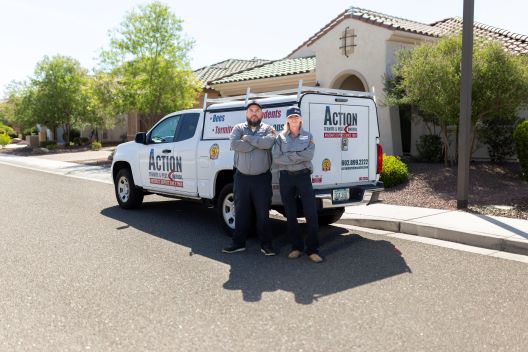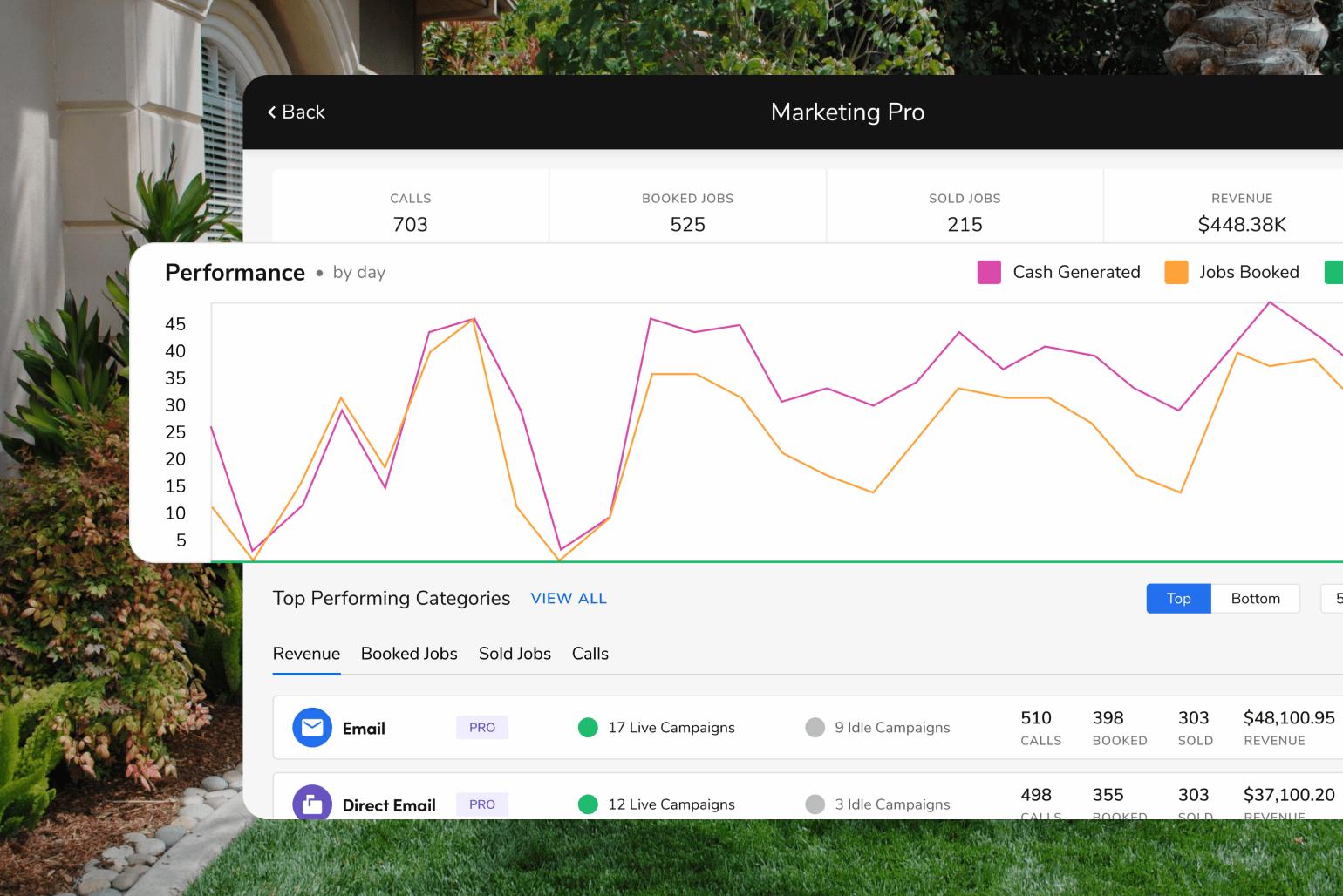Lawn Care Email Marketing Best Practices

Lawn Care Email Marketing Demystified [Tips + Examples]
Email marketing remains one of businesses' most popular strategies to communicate with customers and leads. According to Litmus, email drives an average ROI of $36 for every dollar spent, higher than any other channel.
But marketers can’t just craft an email and hit send, especially in the competitive lawn care industry. A strong email marketing program requires segmentation, A/B testing, creative subject lines, and compelling offers.
Read on to learn more about crafting the best email marketing campaigns for your lawn care or landscaping business.
Identifying Your Target Audience
Your email list likely contains contacts from different sources. You have your current customers, past customers, and leads you acquired through opt-ins, events, and other marketing strategies.
To send effective emails, you must know your target audience and their specific pain points. Maybe they want eco-friendly lawn services. Perhaps they’re looking for year-round plans. And the kicker is that not all contacts have the same pain points.
How to Use Audience Segmentation to Your Advantage
To maximize email marketing for higher engagement and conversion rates, it’s crucial to segment your audience.
Separate your customers and prospects, so they receive personalized emails. From there, find ways to go more granular. For example, take your customer list and segment it by service type: annual maintenance plans, irrigation customers, snow removal customers, etc.
For non-customers, you can segment them by acquisition channel. For example, maybe you have a list from an event you attended. Send that group of contacts a personalized email thanking them for signing up at the event. Include a special offer just for them.
Have a list of former clients? What type of messaging would entice them enough to utilize your services again? Consider sending them a specific offer.
For help with audience segmentation, FieldRoutes integrates with ServiceTitan Marketing Pro to offer quick targeting options. For example, you can create lists that automatically update in real time based on data you already have, like unsold estimates or expiring memberships.
Make sure to test and track results. The performance of your email campaigns provides valuable data about how well you’ve segmented your audience. Low open rates might mean you need to adjust a segment or haven’t found a message that resonates with that particular audience yet.
Crafting an Engaging Email Sequence
Once you build your segments, consider creating email sequences, or an automated series of emails sent based on a predetermined schedule. Examples of how to use email sequences include the following.
For New Subscribers: Welcome Sequence
A welcome sequence goes out to new email list subscribers, and serves as your first impression. Within a welcome series, you want to tell the lead about your company, values, and services with the intention of converting them into customers. Here’s an example of what a welcome series may look like.
Email 1: Welcome subscribers to your list and introduce them to your lawn care company. In this email, tell subscribers what to expect regarding how often you’ll email subscribers and what types of content you send (lawn care tips, special offers, etc.).
Email 2: Before getting too salesy, you want to build a relationship with your potential new customer. Fill your following email with helpful content, like seasonal lawn care tips or common landscaping mistakes.
Email 3: Now’s the time to send a new client offer, whether it’s 15% off any service or a discounted maintenance plan.
For Leads: Drip Campaign
Drip campaigns are a great way to nurture leads down the funnel toward a sale. A drip campaign is an automated email sequence in which each email builds upon the last. A three-email drip campaign could look like this.
Email 1: Start by sending valuable content, such as proper mowing techniques, weed control strategies, or how often to water a lawn.
Email 2: Next, build credibility by sending testimonials from other customers.
Email 3: Lastly, send an exclusive offer. You may consider automating a resend or follow-up if the lead doesn’t open the email or click the offer.
For Inactive Subscribers: Re-engagement Campaign
Many CRMs (customer relationship management) or email marketing software systems allow you to create a segment for inactive subscribers.
You can set the parameters for this, such as non-customers who haven’t opened an email in the past 60 days. Inactive subscribers affect open rates, so it’s best to re-engage them or unsubscribe them from your email list. Try this re-engagement campaign sequence.
Email 1: Tell the subscriber you’ve noticed they haven’t engaged in the content in a while and offer an exclusive welcome-back promotional offer.
Email 2: Showcase recent lawn success stories with before and after pictures.
Email 3: Send them a last-chance email with an expiration date for using the offer sent in the first email. Be sure to mention the offer and its expiration date in the subject line.
Email 4: If the inactive subscriber doesn’t engage with any of the previous emails, it’s time to remove them from your list. Let them know you won’t be sending additional emails unless they choose to sign up again.
4 Types of Email Marketing Campaigns for Lawn Care
The following campaign examples can be included within sequences like the ones showcased above or stand alone as a new campaign.
1. Promotional Campaigns (Special Offers)
Lawn care marketing professionals use promotional campaigns to send special offers to their email subscribers.
Even if subscribers don’t use the offer this time, regular promotional emails help keep the company's brand top-of-mind among subscribers, making them more likely to consider the company next time they need lawn care services.
Campaign benefits:
Promotional emails are another marketing tool used to drive sales and generate revenue for the company, as subscribers are more likely to take advantage of special offers and discounts.
Promotions incentivize existing customers to continue using the company's services, boosting customer retention rates.
Subscribers who’ve shown interest but haven't made a purchase may convert into paying customers when presented with enticing promotions.
What to include in campaign email:
Use a compelling subject line and call to action that converts leads.
Incorporate language that drives urgency, like “limited time” or “book now!”
Be sure to include an expiration date and any offer restrictions.
2. Seasonal Campaigns
Seasonal lawn care marketing campaigns provide a strategic way for landscaping companies to align their services with customers' changing needs throughout the year, such as spring cleanup or fall leaf removal. They help maintain customer engagement, drive sales, and ensure that the company remains top-of-mind during critical times of the year.
Campaign benefits:
By proactively addressing seasonal concerns, the company demonstrates its expertise and commitment to customer satisfaction.
Targeted seasonal promotions can lead to increased sales as customers seek out services specific to the time of year.
Consistent seasonal campaigns can foster loyalty by addressing customers' changing needs and showcasing the company's dedication to their lawn's health year-round.
What to include in campaign email:
Highlight the benefits customers will gain from the seasonal service, such as a lush, green lawn in summer or a well-prepared lawn for winter.
Provide essential details about the service, including what it entails, when it should be scheduled, and any unique features.
Specify a clear expiration date for the seasonal offer to create a sense of urgency. This also helps your office know what to expect for scheduling.
3. Educational Campaigns
Campaigns designed to inform and educate customers and leads about various aspects of lawn care, landscaping, and outdoor maintenance position the lawn care company as a trusted source of knowledge and expertise.
By providing valuable information, lawn care companies can build long-term relationships based on trust.
Campaign benefits:
Customers who benefit from the educational content are more likely to stay loyal to the company and its services.
Educational campaigns increase brand awareness, so subscribers recognize your business as a green industry leader and recall your company when they need lawn care services.
Educated customers are more likely to understand the value of your services, leading to higher conversion rates and fewer price objections.
What to include in a campaign email:
Offer step-by-step how-to guides for DIY enthusiasts looking to tackle specific lawn care tasks.
Engage customers with interactive content, such as quizzes or calculators that help them determine their lawn's needs.
Include a link to a resource library on your website, allowing subscribers to access additional educational content.
4. Testimonial and Case Study Campaigns
Sharing testimonials and case studies builds trust and credibility with your email subscribers. Demonstrating your company’s track record of success and customer satisfaction may convince prospects to choose your lawn care services over competitors.
Campaign benefits:
Case studies can illustrate how your company addressed specific lawn care challenges and provided effective solutions.
Testimonials and case studies provide social proof that your lawn care services have delivered results for real customers, helping to alleviate potential customers' doubts.
Sharing case studies from satisfied customers in specific neighborhoods or regions can resonate strongly with local prospects, showing that you understand their unique lawn care challenges.
What to include in a campaign email:
Include compelling before-and-after photos or videos that visually demonstrate the transformation of the customer's lawn.
Highlight key quotes from customers that capture their satisfaction and your services' impact on their lawn.
Link out to a testimonials page on your website that provides a variety of testimonials and case studies to appeal to a wide range of potential customers with different lawn care needs.
Lawn Care Email Marketing Best Practices
Follow these email marketing best practices to maximize results.
Contact growth: Prominently feature sign-up forms on your website and social media channels to grow your email list organically.
Email lists: Implement a double opt-in process to ensure subscribers confirm their subscription, reducing the likelihood of spam complaints.
Subject lines: Write concise and compelling subject lines that are no longer than 60 characters to avoid them getting cut off. When including an offer, mention the offer in the subject line.
Personalization: Segmentation helps personalize the content, but you can take it further by including subscribers’ names in the email.
Content: Ensure your email content is relevant to the recipient's interests, needs, or preferences.
Design: Create visually appealing emails with a clean and attractive design that aligns with your brand identity.
Accessibility: Design emails with accessibility in mind, including alt text for images and clear font choices.
Mobile optimization: Design your emails to be mobile-responsive, as many emails are opened on mobile devices.
Automation: Use triggers and workflows to automate email sequences.
Test and learn: Evaluate and tweak your email campaigns for maximum success. Consider A/B testing subject lines, offers, or CTAs.
Leverage Automation in Your Email Marketing
The best way to take your email marketing to the next level is to use workflow and trigger automations offered through CRMs or email marketing software. From there, you can create segments that update in real-time, as well as sequences that continuously send to new contacts.
FieldRoutes integrates with ServiceTitan Marketing Pro for email and direct mail templates and automation.
Want to grow your lawn care business with FieldRoutes? Request a free demo today.





